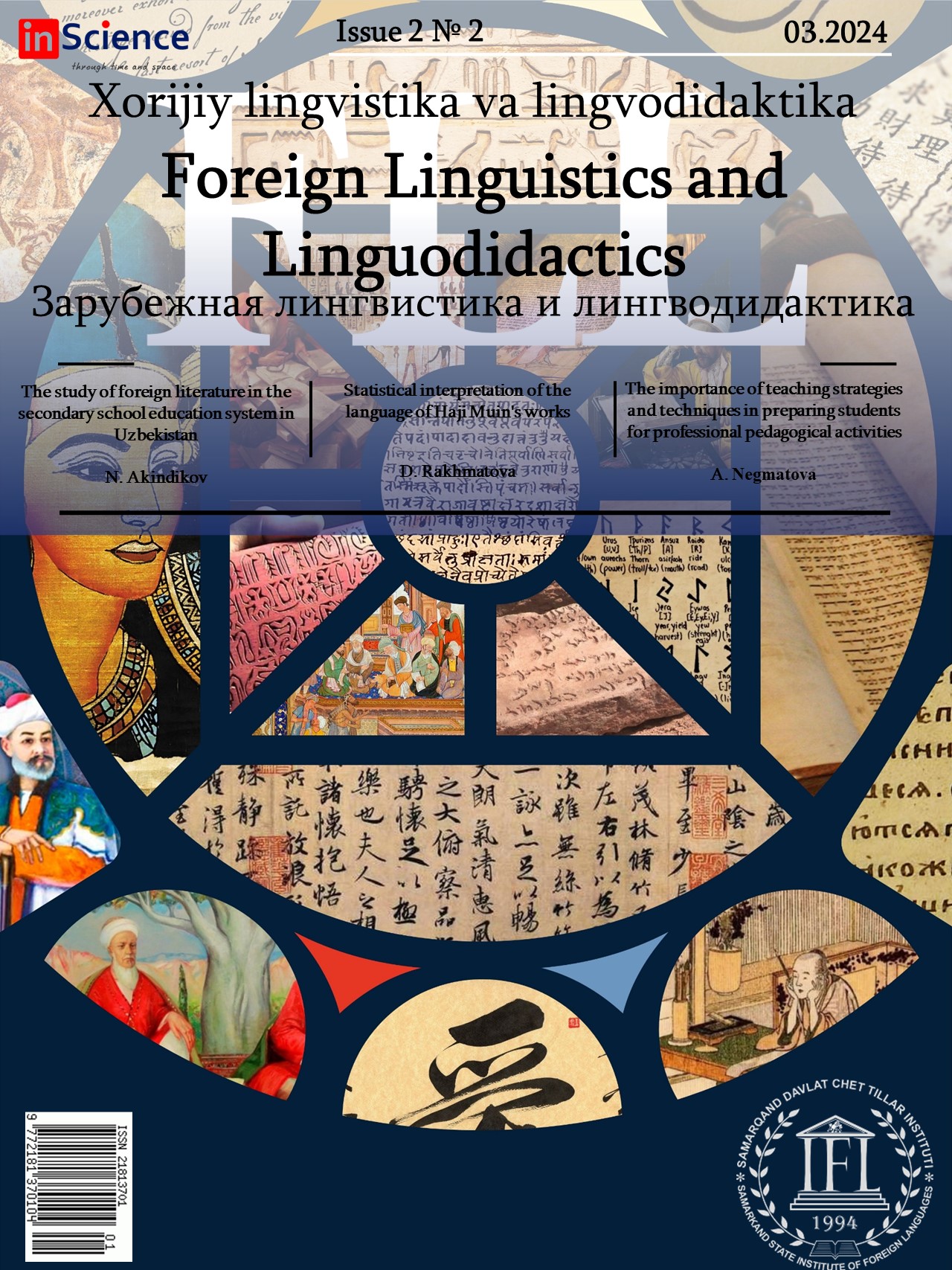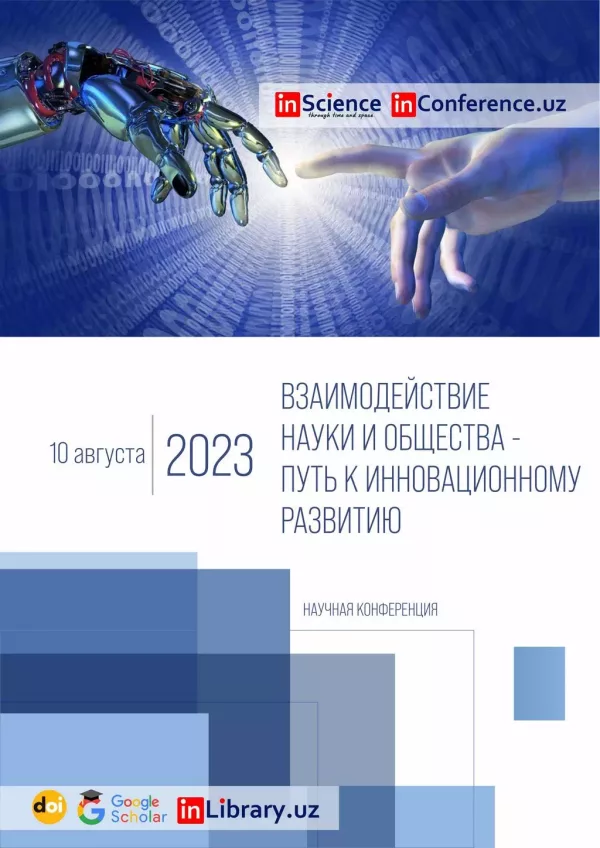DOI
https://doi.org/10.47689/2181-3701-vol2-iss2-pp164-178Ключевые слова
словарный состав / обогащение словарного состава / интерлингвистические факторы / экстралингвистические факторы / заимствования / заимствованные слова / расширение словарного состава / научная терминологияАннотация
Среди многочисленных факторов, способствующих процессу глобализации, значительную роль играет обогащение словарного запаса языков. Кроме того, в этом процессе важное место занимают социально-политические и культурные факторы, а также речь известных личностей, включая поэтов, писателей и политических деятелей.
Данная статья осуществляет системное исследование роли социально-политических и культурных изменений, произошедших в истории англоязычных стран, в обогащении словарного запаса английского языка, а также влияния произведений известных поэтов и писателей. Кроме того, авторы статьи отмечают важность заимствованных слов из других языков и изменений в семантической структуре существующих слов.
В статье применялись различные методы анализа, такие как сравнительные, структурные и контекстуальные методы, а также моделирование исторических и деривационных связей для изучения изменений в семантической структуре существующих слов.
Роль выдающихся писателей и политических деятелей Англии и Америки в эпоху Новой Англии в обогащении и развитии лексического состава английского литературного языка демонстрируется на конкретных лингвистических примерах.
В результате проведенного исследования подробно рассматриваются факторы, оказавшие значительное влияние на обогащение словарного состава английского языка как количественно, так и качественно. Данные факты отражаются с помощью языковых материалов, подкрепленных конкретными примерами. Исследуемые в статье факторы классифицируются на экстралингвистические и интралингвистические, причем этот процесс также основан на конкретных языковых примерах.
Библиографические ссылки
Aloyan L.O. (1967) Morphological structure of adjectives with suffixes -ous in modern English. Dis. abs. PhD (p.18). Leningrad.
Barannikova L.I. (1974) Vernacular as a special social component of language // Language and Society, vol. 3: collection of scientific works. / SSU. (pp. 3-22). Saratov.
Barkhudarov S.G. (1970) On the significance and tasks of scientific research in the field of terminology // Linguistic problems of scientific and technical terminology: сoll. scientific works (pp. 7-10). Moscow: Nauka.
Bloomfield L. (1968) Language. – Moscow: Progress.
Bogorodsky B.L. Speech at a meeting on linguistic problems of scientific and technical terminology//Linguistic problems of scientific and technical terminology: Sat. nauch.tr. – M.: Nauka, 1970. – P. 185-187.
Byalik V.D. (1986) Structural and semantic features and motivation of scientific and technical terms in modern English (based on the terminology of computational technology). Dis. abs. PhD (p. 25). Kiev.
Caso A.L. (1980) The production of new scientific terms//American speech, vol.55, N2 (pp.101-111). Tuscaloosa: The University of Alabama press.
Gardiner A. (1950) The theory of speech. London.
Gerd A.S. (1971) Problems of the formation and unification of scientific terminology//Issues of linguistics, N 1 (pp. 14-22). Moscow: Nauka.
Ginzburg R.S., Khidekel S.S., Knyazeva G.Y., Sankin A.A. (1979) A Course in Modem English Lexicology. Moscow: Vyssaja skola.
Goretsky Ya. (1970) Correlation of concept and name//Linguistic problems of scientific and technical terminology: Coll. scient. Works (p.119-121). Moscow: Nauka.
Hough J.N. (1953) Scientific Terminology. New York: Rinehart and Company, Inc.
Khamzaev S.A. (2023) Essentials of Teaching Terms of a Specific Field to Students of Non–Linguistic Universities. International Journal of Multicultural and Multireligious Understanding. ISSN 2364-5369 Volume 10, Issue 12 December, 2023. https://ijmmu.com/index.php/ijmmu/issue/view/86
Khamzaev S.A. (2022) Semantic Peculiarities of Neologisms Functioning in the English and Uzbek Newspapers. International Journal of Social Science Research and Review. ISSN 2700-2497. Volume 5, Issue 12 December, 2022. https://ijssrr.com/journal/article/download/816/621/
Khamzaev S.A. (2021) Pragmatic Function of Linguistic Units. International Journal of Social Science and Human Research ISSN (print): 2644-0679, ISSN(online): 2644-0695 Volume 04 Issue 12 December 2021. https://www.ijsshr.in/v4i12/Doc/61.pdf
Khamzaev S.A. Gilyazetdinov E.Z. Sultonova N.A. Samanova Sh.B. (2020) The problems of developing an ESP course and the importance of ESP teacher training on the example of Uzbekistan. Journal of Critical Reviews. ISSN- 2394-5125 Vol 7, Issue 7. http://dx.doi.org/10.31838/jcr.07.07.198
Kochetkov V.P. (1969) Parallel suffix formations of English adjectives with the same base//Philological collection (pp.58-64). Leningrad.: Leningrad State University Publishing House.
Kotelova N.Z. (1970) On the issue of the specificity of the term//Linguistic problems of scientific and technical terminology: Coll. scient. Works (pp.122-126). Moscow: Nauka.
Koziol H. (1937) Handbuch der Englischen Wortbfldungslehre. Heidelberg: Carl Winters Universitatsbuchhandung.
Kuldashev A.M. (2019) On some problems and principles of language change. 2019. Science and education. Volume 6, №41 (p. 37-38).
Kuzmin N.P. (1970) Normative and non-normative special vocabulary//Linguistic problems of scientific and technical terminology: Coll. scient. works (pp.68-81). Moscow: Nauka.
Mauer L.V. (1979) On the issue of affixal term formation//Morphemic and word-formation structure of the word: Coll. scient. works (pp.108-114). Kalinin: KSU Publishing House.
Meshkov O.D. (1985) Compounding words in modern English. Moscow: High School.
Passek V.V. (1954) On the problem of the connection between linguistic phenomena and the history of society//Institute of Languages, No.2 (pp.7-24). Moscow: Uchpedgiz.
Rozina R.I. (1977) Social marking of a word in modern English. Dis. abs. PhD (p. 16). Moscow.
Salokkhiddinov G.S. S. Johnson as a lexicographer. Dis. abs. PhD (p. 24). Leningrad.
Savodnik V. (1994) On the issue of Pushkin’s dictionary // News of ORYAS AN, volume VIII, KN.1 (pp. 143-182). St. Petersburg, 1994.
Schweiser A.D. (1971) Questions of the sociology of language in modern American linguistics. Leningrad: Nauka.
Vinogradov V.V. (1967) Problems of literary languages and patterns of their formation and development. Moscow: Nauka.
Yartseva V.N. (1961) Historical syntax of the English language. Moscow-Leningrad: Publishing House of the USSR Academy of Sciences.
Yartseva V.N. (1985) History of the English literary language of the 14th - 15th centuries. Moscow: Nauka.
Zaliznyak A.A. (2001) Semantic derivation in synchrony and diachrony: the project “Catalogue of semantic transitions”//Issues of linguistics. No. 2. (P. 13-25). Msocow.
Zveginsev V.A. (1953) History of the people and the development of the language//Institute of Languages, N 3 (pp. 9-24). Moscow: Uchpedgiz.



